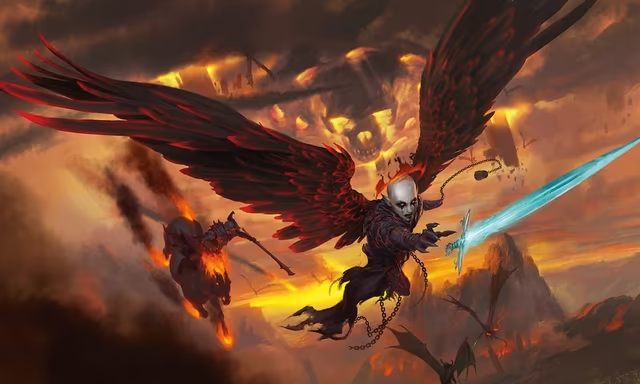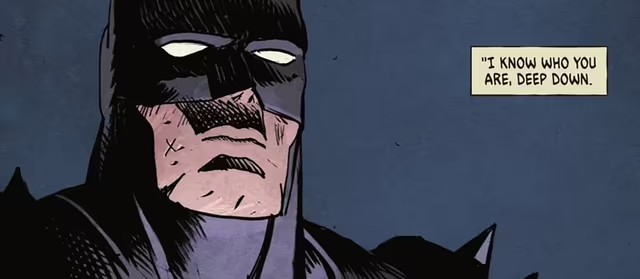If you click on a link and make a purchase we may receive a small commission. Read our editorial policy.
EC Comics is coming back - here's why it's important that anthologies are returning to American comics.
Is it finally time for anthologies to make their rightful return to the American market?

Popverse's top stories
- Where to find Popverse at Seattle's Emerald City Comic Con 2026
- The Traitors US alum Bob the Drag Queen drops a piece of advice for future players: "You are not as good at this game as you think you are"
- Bridgerton season 4 ending explained - did Benedict and Sophie make it work, and who's leaving the show for good?
To anyone paying attention, Oni Press’s upcoming revival of EC Comics is something not only exciting, but vital. That’s not just because EC published some of the most unique genre stories in comics history (and gave the comics industry a much-needed bit of hell in the process), but because it could, hopefully, lead the necessary comeback of anthology comics in the American market.
Sure, anthologies have never gone away — after all, Image has continued to put out series such as Island, Ice Cream Man, and Image! within the last ten years, as well as several attempts at collaborative anniversary anthologies on behalf of Dark Horse and even DC — but for all intents and purposes, anthologies are a mode of comics storytelling that has, sadly, fallen from favor in America.
It wasn't always like this
There’s an irony to America’s deviation from the anthology formula. During comics’ fabled “golden age” — and well into the 1960s — anthologies were one of the main formats of U.S. comics. With titles like Tales to Astonish, Journey Into Mystery, Strange Adventures, Our Army at War, anthologies and their support for short-form storytelling provided an outlet, both for their creators and their readers, to expand their horizons. Each of these titles featured a handful of stories all neatly packaged into one issue, and often with a recurring host who’d introduce each story with arch commentary and a wicked punchline when necessary.
So why did the anthology format fall out of favor with American audiences? The answer to that question is complicated, but the roots lie with the success of Marvel’s revolutionary approach to comics in the 1960s — an approach that favored “book-length” stories that ran across an entire issue (if not multiple issues!) featuring a regular cast of characters. As Marvel’s success spawned countless imitators, fans started to lean away from the short story format previously favored by DC and other publishers, seeing it as a less complex, less mature approach to what comics were capable of.

The death of the anthology (in the US)
Nonetheless, anthologies continued to be an ongoing presence on American newsstands up through the 1980s, when the Direct Market (which is to say, comic book stores) became the primary outlet for American comics. In the Direct Market, there was less of a focus on appealing to newcomers or offering the best bang for your buck — always a big selling point for anthologies, which could boast the most variety and thereby increase the odds that readers would enjoy at least one story. Instead, the Direct Market let fans buy exactly what they wanted with increasing laser focus. Sadly, anthologies didn’t fit neatly inside that narrow-minded sales pitch.
Most other countries haven’t shared these issues either. Frankly, Marvel didn’t care about anywhere outside of the US initially — especially with comics distribution differing so much in the international market. Anthologies continued to flourish in Europe, the UK, and Japan. In fact, they’re arguably the backbone of comics in these places, with Métal Hurtlant hurtling out of the European market with tales that were sci-fi driven with a fantasy backbone, and gifted with an eroticism and sense of adventure backed up by the powerhouses of creativity (Phillipe Druillet and Moebius, just to name an obvious few) responsible for the series. The same can be said for Rebellion Publishing’s 2000 AD – the weekly British anthology series behind Judge Dredd, Rogue Trooper, and countless others, all of which have been published continuously for nearly half a century without fail (largely through news vendors), and without ever sacrificing quality of the stories or their creative lineup. The difference here is, that these publishers – despite the competition of the impending and ever-encroaching American superhero market – have had faith in the value behind the mish-mash of talent and unique approach to genre. This faith in the anthology's value is more of a quavering one for American publishers trying their hand at anthologies.

While anthologies still exist in America, they are often less favored and less marketed by publishers because…well, they just don’t sell as well. Even legacy anthology publishers such as Heavy Metal (the American continuation of Metal Hurlant) are going under with rocks tied to their feet because of lack of sales taken over by superheroes in the Big Two. There have been some attempts, of course, with some true bangers such as Dark Horse Presents, which spanned nearly three decades despite its underwhelming support from its fanbase — or Oni Press’ Xino, a sci-fi graphic novel anthology series that attempted to dive into the oddities and twists of their historical predecessors. Despite these attempts — with passion, gusto, and ingenuity weaponized further with some seriously impressive creative lineups — the fans just weren’t having it.
Where anthologies can take the comics industry
It’s a shame that readers are so resistant, because anthologies have value because they not only offer a variety of stories (both continuing and one-off) to readers, but also offer a variety of opportunities for creators and collaborations. People can try new things without the pressure of carrying an entire book or series by itself, readers can discover new favorites that they might not have expected, and publishers are able to show the breadth of their eye for talent both new and returning. Without the “shield” of the anthology format, would we have had any of the big manga hits that have dominated bookstores in the past couple of decades? Would new creators have had the chance to get published? Would we have even half the names in comics that we worship so loudly now on the comics main stage?
The fact of the matter is that anthologies, both in format and in creative practice, make comics better. They make us more adventurous readers, they make publishers take risks instead of offering complacency, and they offer a space for comics to bring creativity without pressure to the people who work so hard to give us new stories.
EC relaunched with an old school mentality towards comics — holding up their own legacy of pushing back against the norms of the industry, as was always the case with the upstart publisher. May this time it can have its biggest success to date and remind people why anthologies matter. Maybe we can help by being more curious readers again. Maybe we need to remember what it is to journey into mystery.
Get ready for what's next with our list to upcoming comics and how to buy comics at a comic shop, and our guide to all the free comics you can get with this year's Free Comic Book Day and Comics Giveaway Day.
Follow Popverse for upcoming event coverage and news
Find out how we conduct our review by reading our review policy
Let Popverse be your tour guide through the wilderness of pop culture
Sign in and let us help you find your new favorite thing.
















Comments
Want to join the discussion? Please activate your account first.
Visit Reedpop ID if you need to resend the confirmation email.